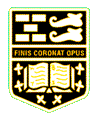|
A student entering the School finds himself confronted with a new language. It is very much to his advantage to master this as
quickly as possible, for until he does he will be unable to converse with his fellow students, and their conversation to him will
be Chinese.
I do not know how old or new this language may be, but after spending much time poring over well-known English and Foreign
dictionaries with a wet towel around my head, I had at last to go to the boys for a definition.
Perhaps a dictionary containing the following words is in course of preparation, but I understand the Printers know nothing
about it.
"Bosky," cross-eyed;
"butt," cigarette end;
"Carps," carpenters;
"Charlie up," reveille;
"cheddars," feet;
"chew-out," a swindle;
"chip," to exchange;
"cozzie," bathing costume;
"crabby," rotten;
"dogs it," to claim;
"dragger," smoker;
"deuce," twopence;
"gas-cake," cake;
"ginnas," bread;
"gozzie," as bosky;
"grog," tea;
"hair grog," hair cream;
"hard cheese," bad luck;
"hard up," miser;
"lardie," stale;
I must apologise if any of the above words are wrongly spelled, for not having seen them before in print, I have had to spell
them as I have heard them pronounced.
R. H. P
1942.
|



